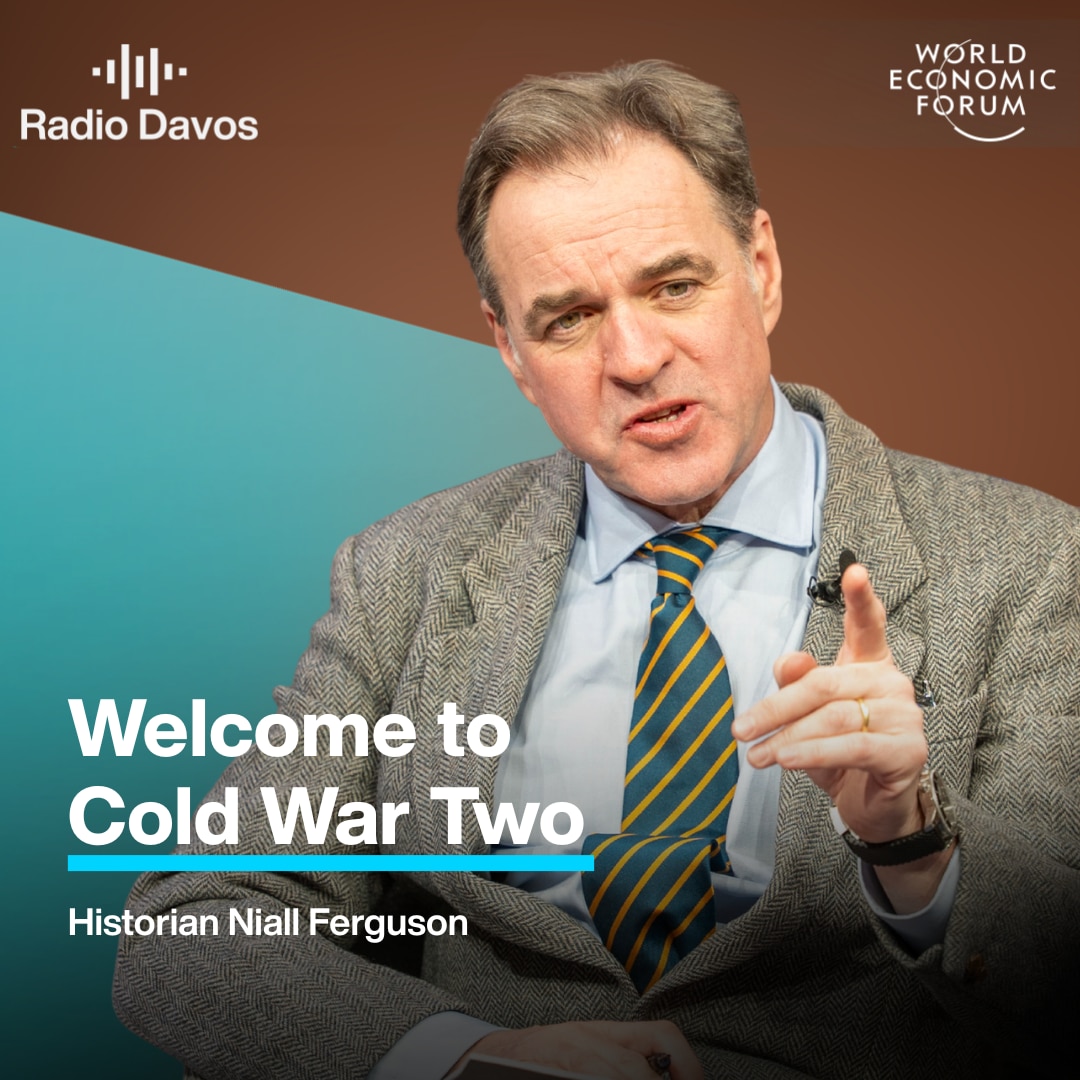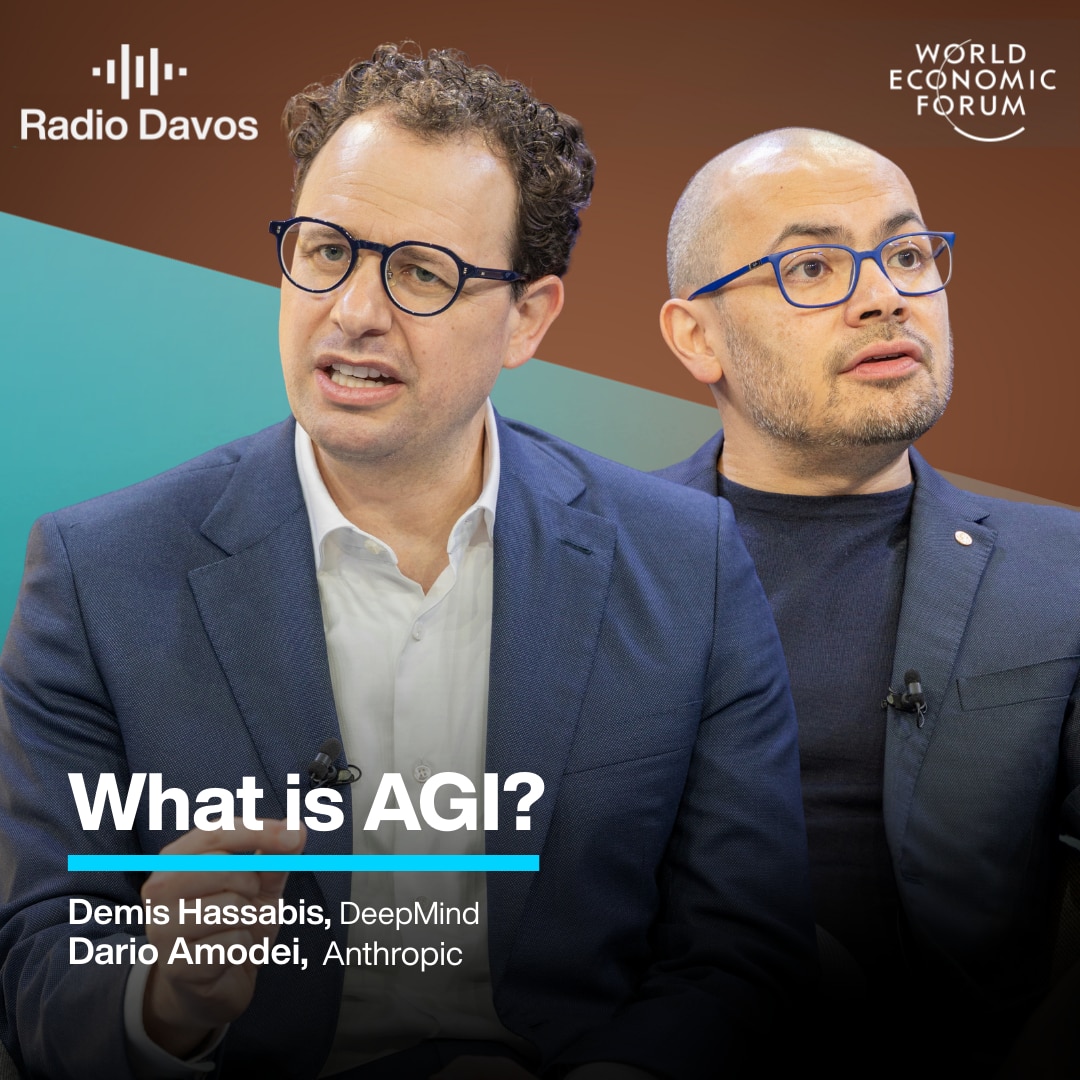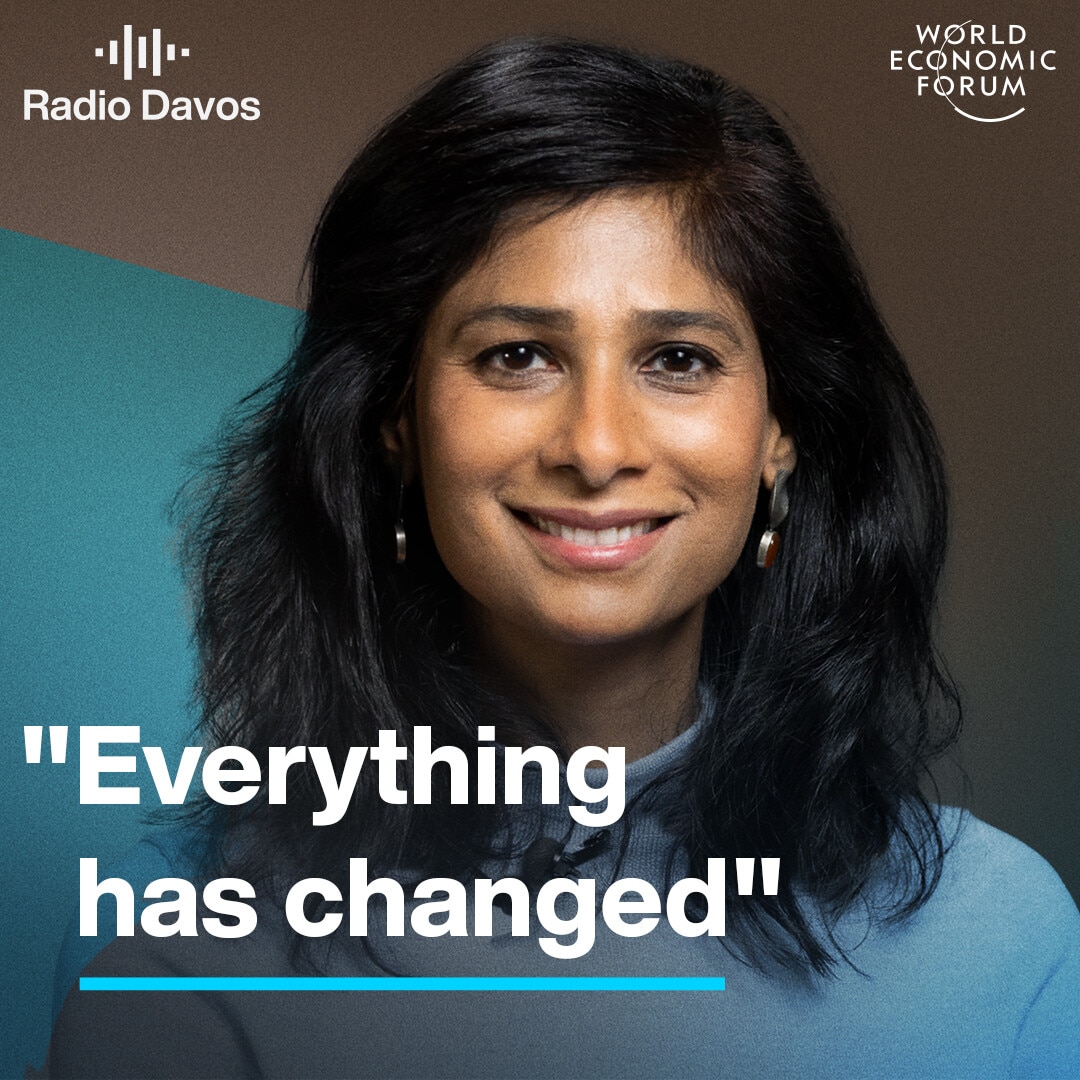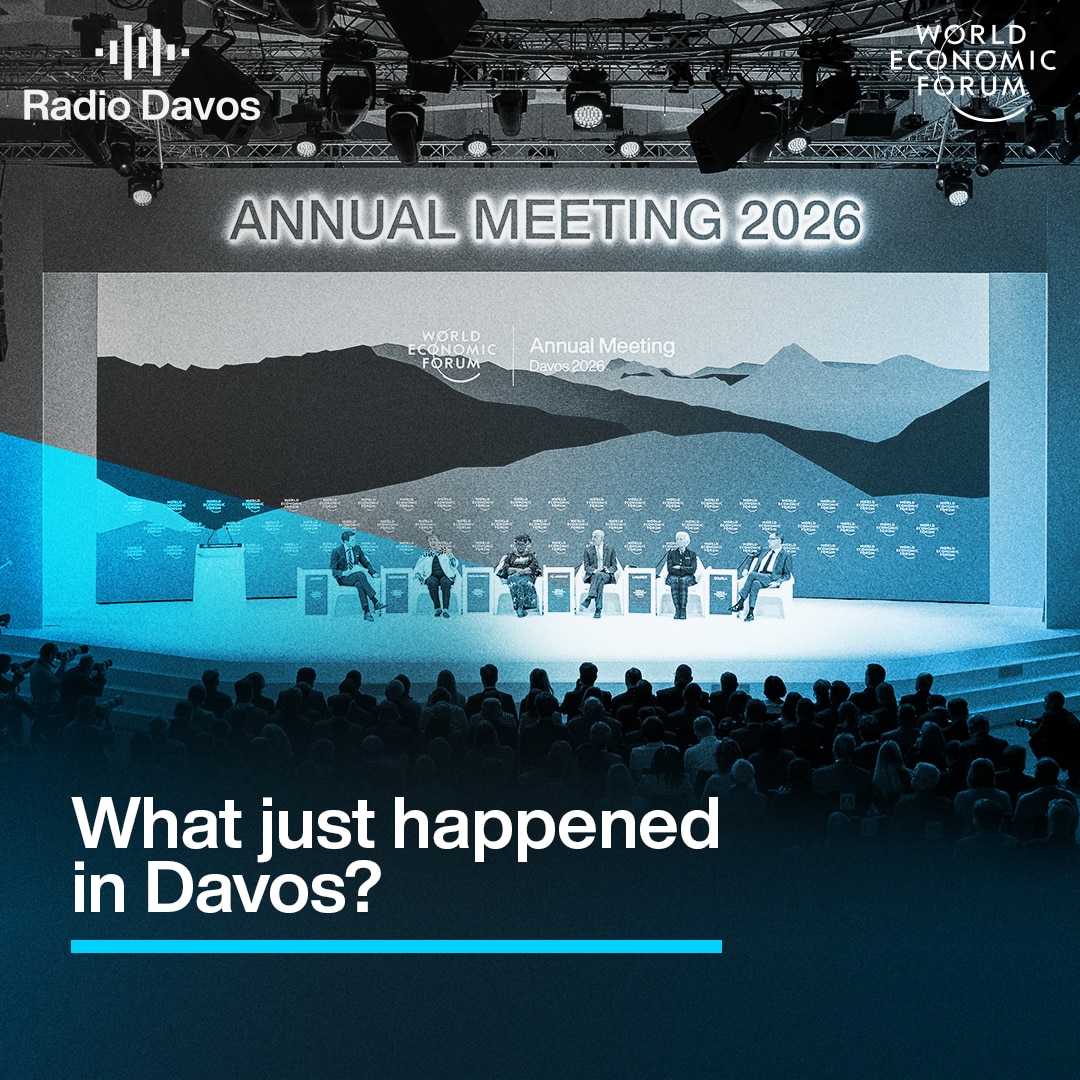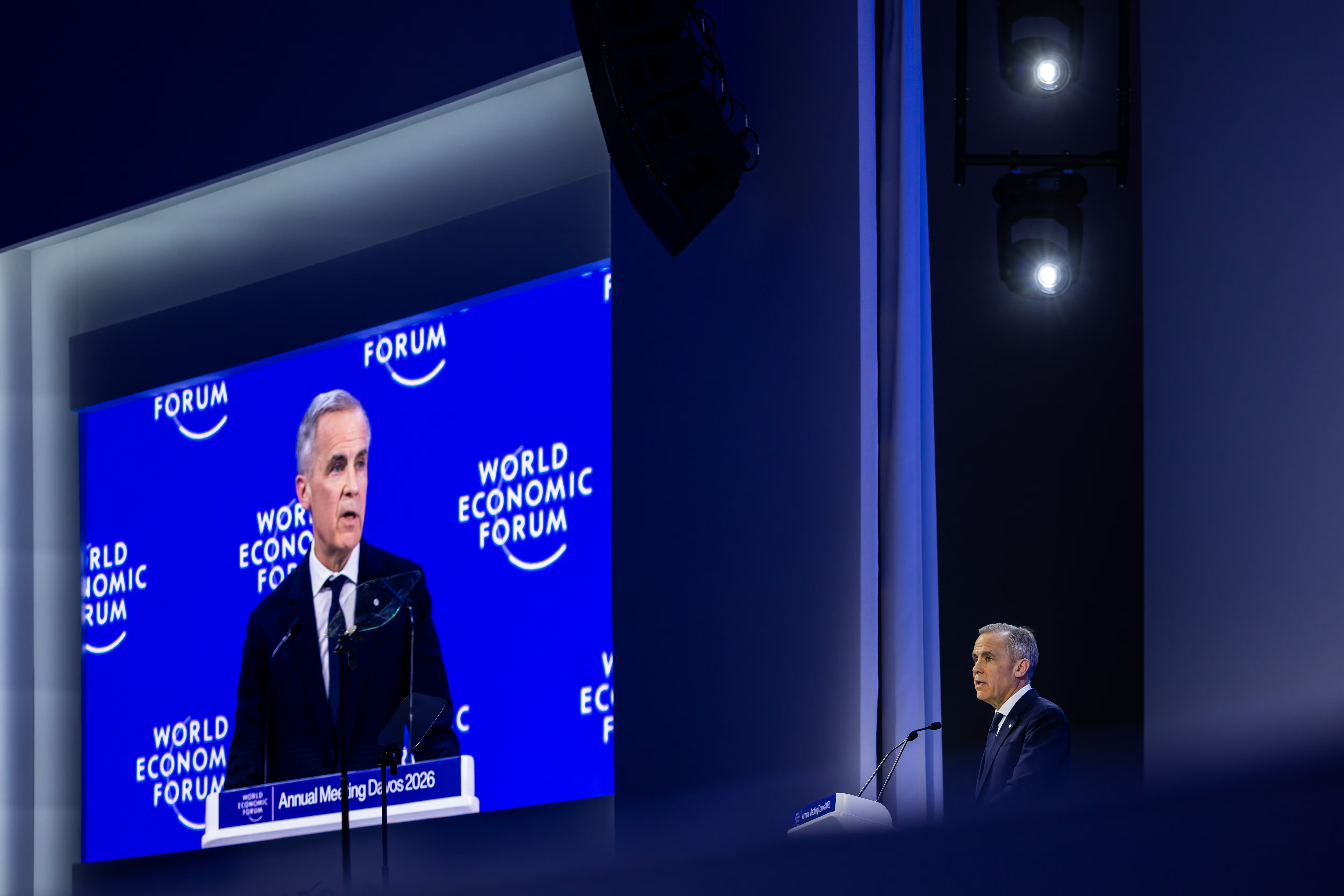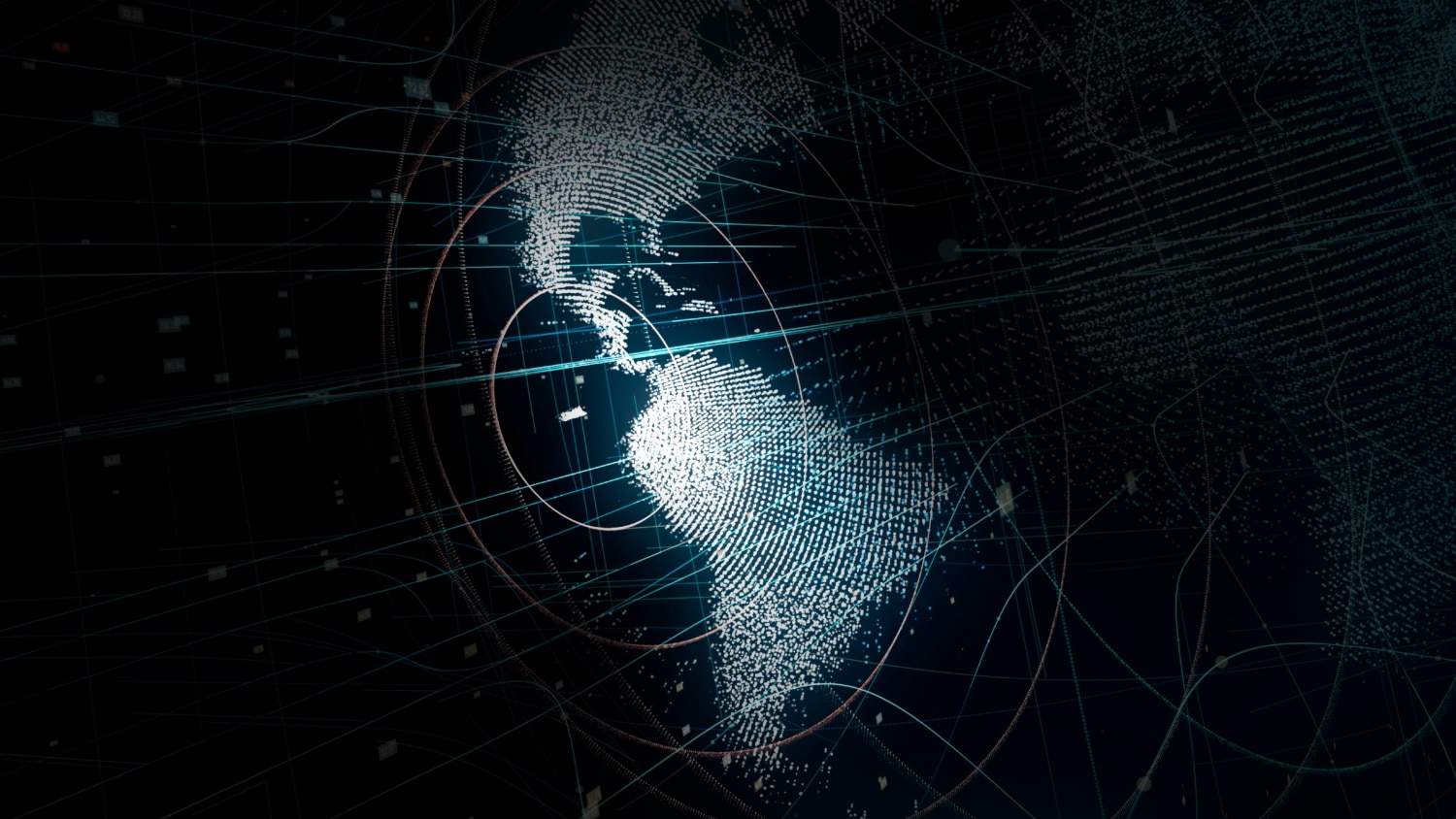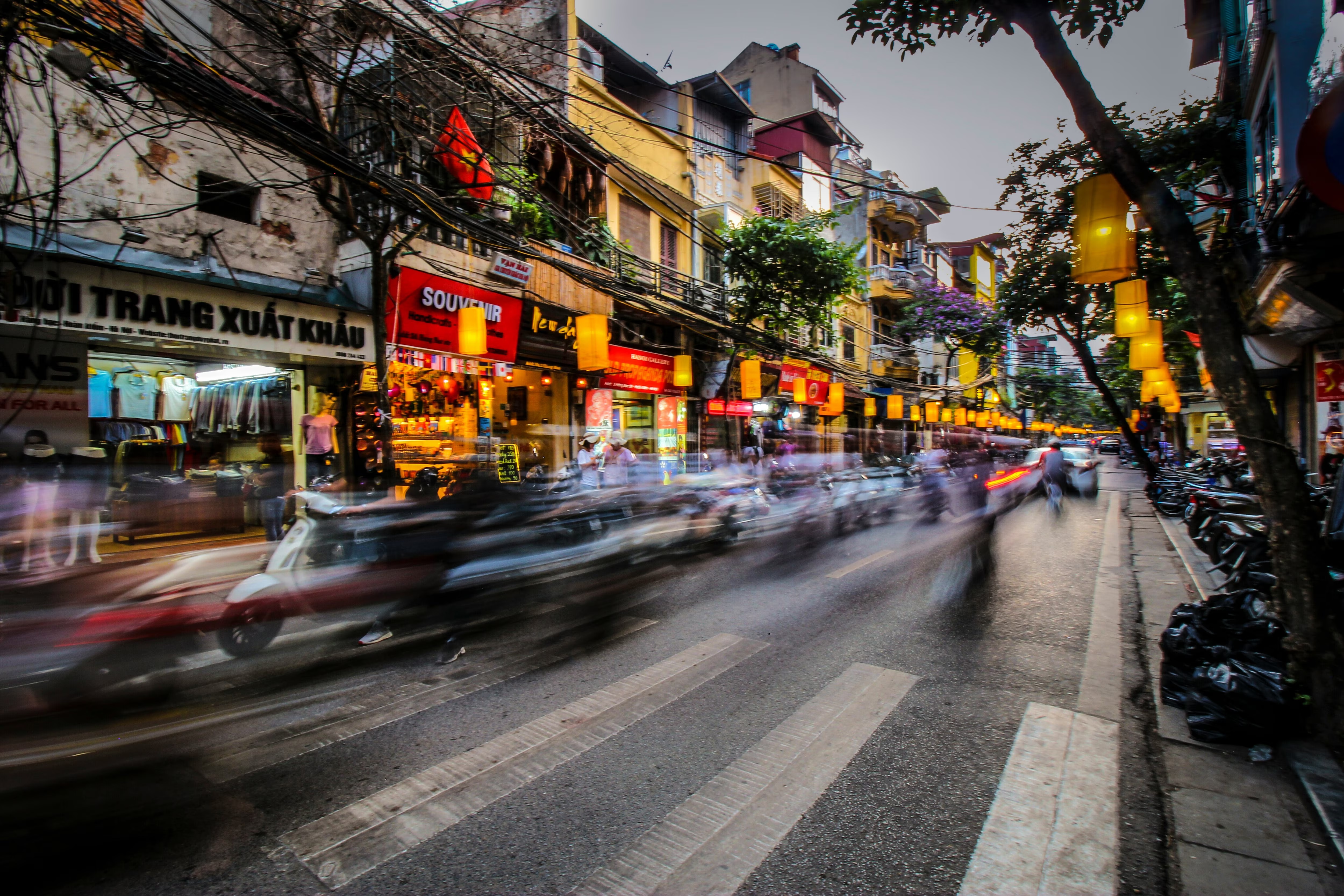Ian Bremmer, Rachel Botsman and Azeem Azhar: 3 experts on the state of the world in 2024
播客文字稿
This transcript has been generated using speech recognition software and may contain errors. Please check its accuracy against the audio.
Azeem Azhar, Exponential View: They say it's darkest before dawn. I think we're quite far away from it being the darkest. The political, geopolitical, situation is really, really difficult and challenging
Robin Pomeroy, host, Radio Davos: Welcome to Radio Davos, the podcast from the World Economic Forum that looks at the biggest challenges and how we might solve them. This week, we hear from someone who says 2024 is a 'Voldemort' - a year so bad you dare not speak its name…
Ian Bremmer, Eurasia Group: A backdrop of very significant geopolitical instability.
Robin Pomeroy: Ian Bremmer, a leading analyst of political risk, tells us 2024 could be an "annus horribilis", while Azeem Azhar, an expert on fast-growing technologies, thinks we’re in what should prove to be an “incredible decade”
Azeem Azhar: All of these things are going to continue to deliver over the next decade. I think there's an incredible decade coming up.
Robin Pomeroy: If you’re not sure if we’re in an annus horribilis or an incredibile decennium - one thing is certain right now: uncertainty.
Rachel Botsman, Oxford University Saïd Business School: Uncertainty in the world, in scale and complexity, whether that's geopolitics, climate change, changing technologies, it's growing, and therefore you need more and more trust.
Robin Pomeroy: Rachel Botsman, who teaches about trust at Oxford University's business school, tells us how we can all rebuild, or re-earn, trust.
Rachel Botsman: Younger generations have a very different attitude to trust and that scepticism could become a really healthy thing.
Robin Pomeroy: Subscribe to Radio Davos wherever you get your podcasts, or visit wef.ch/podcasts where you will find our sister programmes, Meet the Leader and Agenda Dialogues.
I’m Robin Pomeroy at the World Economic Forum, and with three experts analysing that state of the world in 2024…
Azeem Azhar: It could be horribilis and yet we could see some real progress. So all of those things can happen at the same time.
Robin Pomeroy: This is Radio Davos
2024 is a year of uncertainty - billions of us are voting in elections that could redraw political and geopolitical maps. The impacts of war are being felt around the world. And technology - not least the rapid rise of artificial intelligence - are set to change our lives in ways we are struggling to comprehend.
So on this episode we will hear from three leading experts on the state of the world who spoke to us at the World Economic Forum’s Annual Meeting in Davos.
The theme of that meeting was ‘rebuilding trust’ and we’ll speak to Rachel Botsman, who teaches on trust in the digital world at Oxford University's Saïd Business School.
And Azeem Azhar, the writer and podcaster of the Exponential View, tells us why we should see the glass as half full.
But first, political scientist Ian Bremmer. He founded the political risk consultancy Eurasia Group which in its report on the Top Risks of 2024 said, and I quote:
“2024. Politically it's the Voldemort of years. The annus horribilis. The year that must not be named. Three wars will dominate world affairs: Russia vs. Ukraine; Israel vs. Hamas; and the United States vs. itself, ready to kick off at any moment.”
Ian Bremmer
I asked Ian Bremmer why he was so downbeat on 2024.
Ian Bremmer: Well, I mean, in part because I'm an American, and this election period is unprecedentedly challenging. It is suffused with disinformation, something that the World Economic Forum has talked about as its top concern, for the next ten years, on the basis of its expert network.
I completely agree with that. But but also, because, the impact of this election comes against a backdrop, of very significant geopolitical instability.
Robin Pomeroy: How can we positively turn any concerns that we have into, even on a personal level, moving forward with that burden of doom and gloom, if that's what you have?
Ian Bremmer: Well, at the global level, it is taking advantage of crises that are in front of you. The reason we have global governance moving on climate and we can look forward, our kids can look forward, to a world of sustainable, inexpensive, decentralised energy that is not based on carbon, is because we took advantage of crisis. Okay, maybe later than we should have, maybe not as much money, but we are doing it.
So these crises have to be crises that motivate us to to act.
And the worry, of course, with what's happening in Russia-Ukraine is people are getting tired and they're sick of the crisis, and they don't want to use it to mobilise, to act. So that is the crux of this conversation.
Individually, though, which is perhaps the most important thing, it is, there are a lot of people in this environment that are becoming unhinged. They're losing their minds. They're getting trapped in disinformation. They're getting disintermediated as human beings by the algorithm, which doesn't treat them as citizens, it treats them as products. And we need to reach out to those people. We need to connect with those people face-to-face, long-form and engage.
We need them to be part of the solution and not lost to depression and anger and ennui. And this is an environment where it's very easy to write those people off.
I personally in my job, when we put our top risks report out, I made a point in the first couple of days to go and talk on Fox News and CNN and MSNBC. And I looked at the people that were commenting on social media from left and right and centre from all over the world, and I engaged with them personally, as individuals, which took a little time, but I want them to feel connected to me and heard. I want them to feel like, you know, I may not agree with them on everything, but I'm being honest. I'm being authentic.
Because if you can make that connection, again, if you can meet these people where they are, especially people that you care about, you already know, you have a better shot of actually doing something with that connection. And we're in a world where the algorithm doesn't allow you to make that connection. So we need to find a way to get outside of that.
Robin Pomeroy: Ian Bremmer. He made a great point there about how difficult, but how vital it is that we find ways to engage with people we disagree with, a subject also taken up by our next guest, author and academic Rachel Botsman. My colleague Nicky Rowe spoke to Rachel - an expert on the theme of this year’s Davos - rebuilding trust.
Rachel Botsman
Rachel Botsman: My name is Rachel Botsman. I am an author and a lecturer on trust. And I have been studying and teaching people about how trust works in the world for over 15 years now.
Nicola Rowe: Why is trust so important and specifically trust in the workplace?
Rachel Botsman: It's it's a word we use a lot, but we often don't realise its value importance until it's gone.
But the way I define trust is trust is a confident relationship with the unknown. So when you see trust through this lens, you start to realise why it's the social glue of relationships. Why it enables collaboration and organisations. Why you can't have innovation without trust.
But also when you see trust through this lens, that is a confident relationship with the unknown, you start to realise that the greater the uncertainty, the more trust you need in your life and in your workplace.
So this is why I think it's become front and central for organisations, is that uncertainty in the world, in scale and complexity, whether that's geopolitics, climate change, changing technologies, it's growing and therefore you need more and more trust, between employees, employees and leaders within the culture of the organisation.
Nicola Rowe: Why do you think that we've had this trust erosion?
Rachel Botsman: Let me break this apart, this idea of trust being in a state of erosion. It's not actually true. It's a big misconception about trust that it's in a complete state of decline. It's not actually helpful as well, because it sort of amplifies the fear.
So it's less a case of trust in a state of decline, and more that it's in a state of displacement. So trust is being distributed.
Trust for a long time in organisations, particularly workplaces, is what I call institutional trust. It worked in a very top-down and hierarchical and linear fashion. So if you were a leader, you expected to be trusted. If you said something, you expect to be trusted. Now, what technology does is it blows that up. And trust now flows through networks and marketplaces and platforms.
So if you look at what's happened with information and the media, you no longer have one trusted source, right? You go to multiple different distributed sources. That is now playing out in workplaces, and it's creating chaos because in many ways the rules and the boundaries of institutional trust are far simpler.
You know, a leader used to set the boundary and then the employee would follow. But that power has shifted. Employees expect to set the boundaries.
Nicola Rowe: Could you go into a little bit more about distributed trust?
Rachel Botsman: I should say distributed trust is not necessarily a good thing, right? What we want to find is sort of a hybrid between these things, where there are structures and there are boundaries and there is clarity. But at the same time, this is happening, like the nature of trust. The dynamics of trust are changing.
And if you can look across all different sectors of society, think about finance, right. The rise of things like cryptocurrencies, you're taking centralised forms of value and you're distributing them.
Think of education the way people can find anything to learn online now. We talked about social media even things like Airbnb. These are all forms of distributed trust ecommerce, eBay, Amazon, Etsy.
Dating is another example, that you can find anyone through these distributed networks.
So these same patterns have now come into the workplace, these distributed dynamics. And that is really complicated because you know employees they no longer just look up. They're no longer sort of deferential to power. And you look around the World Economic Forum and, with all due respect, I understand why that is a threat, particularly to many men, because they still form the majority of the leadership roles.
And even in the language of trust, it's really revealing. So the theme this week is rebuilding trust. Now that is a power dynamic. So I will never say the words building trust. I always talk about earning trust because if you think about in any relationship and you magnified this in a workplace, right. You have a giver and you have a receiver of trust. Now, most leaders should say I'm also the giver and the receiver. I play both roles, but they often think of themselves as the receiver.
Now building trust thinks, I have control over you. I'm going to do something and then trust will follow. But actually, who has the power? The power is the giver. The power is the employee, not the employer. They can decide whether they to give you their trust or they don't.
Now this is really frustrating, right? Because as a leader you can say, well, I behave in a trustworthy way. I gave you a really great job and you're really well compensated. Why don't you trust me? So I think this is another really important dynamic that we have to guard this language of 'building trust', because it's in psychology. It's described as a 'power over' form of leadership. And what we need is, they call it 'power with', I'm with you. And that's very similar to what we're seeing with trust dynamics.
Nicola Rowe: Is there a hopeful note that trust can be re-earned?
Rachel Botsman: There's definitely hope. One of the things I love about teaching is younger generations, they have a healthy degree of scepticism, and there's kind of this disconnect in their lives where, I always say speed is the enemy of trust, right? So they're given all these tools that speed up their trust decisions, but in some way they are more sceptical in a healthy way around who they give their trust to. They realise that that is something precious, that it's not just going to be like, well, my dad voted for that party, so I'm going to vote for that party, right?
The scepticism can be incredibly healthy if it's channelled into constructive disagreement. So, 'I'm sceptical of this. I'm not sure. I'm not going to take it at face value'. So how do we turn that into constructive disagreement?
So I think younger generations have a very different attitude to trust. And that scepticism could become a really healthy thing. That for me is a green shoot.
I think people are realising that too much focus has been put on trust in leadership, on individuals, versus systems. And, you know, very robust, trustworthy systems can withhold untrustworthy people.
And so investment at systemic level, I think we're starting to go: right, it's not the individual, it's the system that is broken. So how do you fix the financial system, the media system, the system of democracy, these huge things, that can withhold untrustworthy individuals.
And that doesn't sound like a sign of hope, but it is because the energy shouldn't be on an individual. That shouldn't consume our psyche. It should be, how did this person come into power? Why are people trusting them? And how is the system strong in trustworthiness that it can still hold?
Robin Pomeroy: Rachel Botsman.
Azeem Azhar writes and podcasts about what he calls the exponential age - where technology is changing our lives at speeds that are hard to grasp. He believes we are heading for an “incredible decade”. This is some of our chat from Davos.
Azeem Azhar
Robin Pomeroy: So I was talking to Ian Bremmer yesterday about predictions for the year he's called this year annus horribilis, the Voldemort of years, the year that dare not speak its own name. I mean, he's looking very much at policy, political risk, he's very concerned about the political situation.
You talk about the incredible decade. I want to hear the the upsides now. Why is this an incredible decade?
Azeem Azhar: Let me agree with Ian. I mean, they say it's darkest before dawn. I think we're quite far away from it being the the darkest. You know, the political, geopolitical situation is really, really difficult and challenging and straining capacity.
But the reason I think there's an incredible decade coming up is because these exponential trends that have brought the prices of lithium ion batteries down, the price of solar generated electricity down, that have seen these radical improvements in performance in synthetic biology resulting not just in a plethora of new vaccines but also in these genetic medicines to deal with cancer and other types of issues, and of course, you've got the AI on its exponential curve. All of these things are going to continue to deliver over the next decade.
But unlike the past decade, where those trends were still in place, we have an opportunity to recognize that we're living in exponential times. And the idea that energy independence becomes more broadly available. The cost of energy comes down. There's huge cognitive expansion in every type of economy, that there are new types of therapeutics and therapies to deal with health conditions, puts us in a really, really great position. It creates policy space actually for governments while improving welfare.
I want to be really clear. I'm not talking about reaching a utopia. I'm not talking about a Pollyanna-ish story where conflict and disagreement disappears. I think they stay. I think politics becomes as important, if not more important, over this period of time.
But there is a moment where technology is going to create some space for us to perhaps spend some time on those types of outcomes.
Robin Pomeroy: That's a really interesting hypothesis and kind of shows a certain optimism in human nature, without being Pollyanna-ish.
What about the climate crisis? We've known how to fix climate change for decades. And we've even been convening people for decades. You know, COP28, that's at least 28 years.
Azeem Azhar: That's right. There are more COPs then there are Fast and Furious spinoffs, right?
Robin Pomeroy: Okay. I think that puts it in context for everyone. We we know how to solve climate change, it's actually relatively simple in theory, but humanity just seems not to be able to do it. Do you think that is going to change? Is it going to change fast enough?
Azeem Azhar: Well, I think when you say we knew how to solve climate change, we knew the recipe, but there was some really incredibly complex parts of it. For example, the economics weren't in place, so you were going to have to figure out how to get people to agree to something like a carbon tax, for example.
And now what's happened is that the economics are in place. It is cheaper to build electrical systems using solar power with different types of storage than it is to build new gas power stations and keep them running. The fact that technology is smart and it gets cheaper and cheaper, so you know that your solar price is going to be either fixed or lower in the future compared to oil or gas, where you have no idea, it's up to the local autocrat to decide, has changed things.
Now that the solutions are economically justifiable, you don't need to use politics to persuade people to do that. So that puts us in a in a different position.
The challenge, of course, is that because that's now happening in 2024, we've already strained a whole load of earth systems, and we have to now start to contend with people adapting to that change, which might include migrations or the failure of certain types of local economies. And that, of course, adds to significant pressure. And there is this unknowability about how bad climate effects might manifest themselves over the coming years. But the technology is now helping because it is making the political trade-offs a little bit easier.
Robin Pomeroy: You mentioned to me the 'deepening of the energy and intelligence fabric'. What do you mean by that?
Azeem Azhar: Today's energy system, effectively, there's a handful of places that power is produced and gets piped over lines to to the to the consumer. The new energy system that we're going to get to is going to be peppered a bit like the internet with generation all over the place, some further away, some closer by. There's going to be storage of different places in, of different amounts in different places. It's going to be much smarter because we will start to manage demand according to where capacity is available, and pricing will start to change.
So instead of having this dumb energy system, we'll have a really, really smart energy system that in some cases will be built with over-capacity because it's so cheap to build that capacity. And that creates new opportunities and new industrial opportunities.
In the case of intelligence, what what we will start to see is, not just a sort of a cognitive expansion, because white and blue collar workers will have tools that help them think a bit quicker and kind of focus on the things that matter. But we will also be putting more and more intelligent systems, that is systems that can process information inputs and make a decision on them throughout our economy.
In the simplest way, it allows for more efficiency. You know, you don't waste as much water or heat. But it will allow, I think, for kind of more sophisticated interactions that we might struggle to imagine or make sense of today.
Robin Pomeroy: I wonder if if you have any other predictions for the coming year. One thing that was raised that leapt to the top of the World Economic Forum's Global Risks Report, which was issued just before this meeting, was misinformation and disinformation. And I know you have used this phrase, 'epistemic crisis' - is that the same thing?
Azeem Azhar: Well, I think the epistemic crisis is a wider manifestation of misinformation and disinformation.
The epistemic crisis has been brewing because we have started, through a set of different incentives, the way the media industry works, the way politicians work, the call for polarization, to use the very nature of facts and the science that supports that as a bargaining chip for political power. And so we find ourselves in 2024, with 4 billion people going to the vote against a backdrop of 25 years of not investing in the types of things that create resilient, cognitively aware, informed, critical citizens.
And so I agree that misinformation, disinformation is a really, really important problem. And it's a big risk for this year with all the elections going on and will play out in different countries differently. But it's not because of large language models. It's because we have this unhealthy diets and poor practices for at least 25 years, that we have found that we can't run up the stairs of knowledge objectivity as well as we might have done.
Robin Pomeroy: Do you see a way out of it? What's the solution?
Azeem Azhar: Well, there's always a way out of it.
It's a complex problem. So it's not mono-causal. I think that you start to see the big tech platforms work on electoral integrity and being better and better at content takedowns, for example, YouTube has had to do this with extremist content for, you know, a decade or so.
I think media businesses have to start to understand how important it is that they are not driven by the race for the click, but they have a sense of verification throughout their entire newsgathering and reporting process, not just at the end, and that they take on sort of best practices like self review and after action review, when they go out and put out a false story and they hold people to account and they work out what they can improve.
Then we need to start to get political parties and politicians agreeing to codes of conduct.
Little by little, lots of different measures that we can take to bring us out of this epistemic crisis.
It's a little bit like, you know, if you're morbidly obese, it's not as simple as taking Ozempic or a semaglutide. You know, you also have to change your diet. You also have to start to do some exercise. You have to improve your sleep. There's no there's no magic pill. And there isn't in this case.
Robin Pomeroy: Again, there is delightful optimism, that news organizations would move away from this lure for the click headline. But I suppose there will be news organizations who really feel they need to gain or regain that reputation for fairness and accuracy.
One of the other potential problems is people would say, well, there's the free speech thing, right? We should be allowed to say whatever we want. Who are you to take this off the social media platform? Who is this nanny or who is this authority that's going to say, actually, this is the truth.
How do we find a way for broad discussion of legitimate views? That's very hard, isn't it? Without without alienating a lot of people who are saying, hold on, you're up in Davos telling us what to think or what to read or what to write. It's a very delicate issue.
Azeem Azhar: I think there's just factuality that exists and processes that exists.
But I'll give you an example. During the current crisis in the Middle East there was an explosion at a hospital and within a few minutes of that explosion taking place, I happened to be in the time zone at the time, the newswire services were reporting, both claiming who the perpetrator of it was and that 500 people had died. And I remember sitting in my hotel room thinking, how on earth did they count 500 bodies in six minutes at night after an explosion? And it's not it's just not possible to do that tally.
So the news organizations and news wires who are normally our last line of defence because they're the ones who are really meticulous about trying to just report what they see, failed in their identification of the perpetrators. They failed in their counting of the number of victims. But even it just didn't make sense that one could count that many in that short period of time.
And so there's an example where this is not, you know, someone in a mountain in Switzerland saying, this is what you should think. It's just like it didn't make any sense to be able to report it in that way. And there would be better ways to report what's going on. 'There has been an explosion,' and so on and so forth. And, of course, the trouble is that that story, as all stories do, you know, they travel around the world faster than the retraction can go. And that's replicated time and time again.
So it's not about saying, we need to know what you think, but it is about processes like that.
And I don't think that takes you to a monoculture. I think it takes you to a place where there's a lot of stuff we can agree on, and lots of things we simply don't agree on, especially when that driven by value judgments and values and culture. And that's where this the contested space of politics reemerges.
And why I said earlier, I'm not giving you a Pollyanna-ish utopia where politics ends. I think it continues. It gets more important. And hopefully it gets more civil with it.
Robin Pomeroy: You've raised several issues which we will be able to see between this Davos and the next one where they go. Whether it's an annus horribilis or mirabilis.
Azeem Azhar: It could be both as well. It could be horribilis in how ugly the political debate gets. It could be horribilis in the path, the way in which the votes end up in the different boxes. And yet we could still see some real progress in terms of decarbonizing the energy system and improvements in AI. So all of those things can happen at the same time.
Robin Pomeroy: Azeem Azhar. You also heard in this episode from Rachel Botsman and Ian Bremmer.
And if intelligent analysis about the state of the world is your thing, you should check out the WEF's Strategic Intelligence platform, a curated mix of contextual insights designed for decision-makers, on topics ranging from Artificial Intelligence to Zimbabwe - you can find out more at intelligence.weforum.org.
And for lots of intelligent podcasts, please visit wef.ch/podcasts. And join the conversation on the World Economic Forum Podcast club on Facebook.
This episode of Radio Davos was written and presented by me, Robin Pomeroy, with additional reporting by Nicky Rowe. Studio production was by Taz Kelleher.
We will be back next week, but for now thanks to you for listening and goodbye.
Scroll down for full podcast transcript - click the ‘Show more’ arrow
What's in store for 2024?
Ian Bremmer's political risk consultancy predicts an 'annus horribilis' but Exponential View's Azeem Azhar says we are in an 'incredible decade'.
So is the state of the world 'glass half empty, or half full'?
And in an uncertain world, Oxford University's Rachel Botsman, tells why trust is so vital, and how it can be re-built, or rather, re-earned.
Guests:
Ian Bremmer: https://www.eurasiagroup.net/people/IBremmer
Rachel Botsman: https://rachelbotsman.com/
Azeem Azhar: https://www.azeemazhar.com/
World Economic Forum Strategic Intelligence:
World Economic Forum Global Risks Report 2024:
Related podcasts:
Check out all our podcasts on wef.ch/podcasts:
主持::
分享:
更多集:
每周 议程
每周为您呈现推动全球议程的紧要问题(英文)

